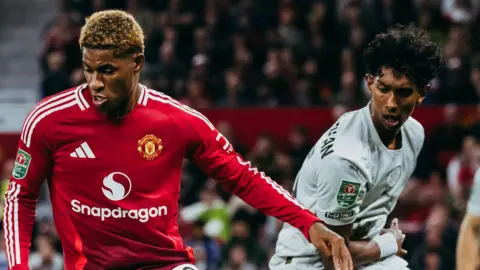[ad_1]
 Getty Images
Getty ImagesWhen Vimal Yoganathan first stepped on to the pitch for Barnsley, bosses at the club knew they’d found a special talent.
The 18-year-old is praised for his speed, mentality and his ability to play with both feet – but that’s not the only thing special about him.
Vimal is the first Tamil footballer to play professionally in England – one of just a handful of players from a South Asian background employed in the top four leagues.
“Being a role model will be a big part of being a footballer,” he says. “Hopefully I can do that and inspire younger players coming through – especially Tamil people.”
Vimal’s family comes from Sri Lanka and the midfielder grew up in Trelawnyd, a small village in north Wales.
He says he didn’t have many friends from a similar background as a child and sometimes “it was a bit difficult”.
He tells BBC Asian Network that while his family was welcomed by the community, “there weren’t people you could 100% relate to in terms of fitting in to a predominantly white area”.
It wasn’t long before he was scouted by his boyhood club, Liverpool, signing for their academy by the time he was eight.
He went on to join Barnsley’s under-16s side and rose through the ranks there.
In August, he scored his first senior goals for the League One club and earlier in the year made his debut for the under-19s Welsh national team, coming on as a sub during a clash with Belgium.
 Getty Images
Getty ImagesAt 6ft 3in (191cm), it wasn’t just his height that made Vimal stand out at Barnsley, according to the club’s academy director Bobby Hassell – but it certainly helped.
“He came in at 15 years old, a really tall, gangly, skinny lad – didn’t look like a footballer at all in all honesty,” he says.
“It was his aggression really that was a stand-out for all the coaches.
“You don’t generally find 15-year-olds coming in and tackling like he did.”
In 2023, there were just 22 professional players with South Asian heritage aged 17 or over in England’s top four leagues.
With about 5,000 professional footballers in the UK, that represents about 1% of players.
Although still small, those figures, from the Professional Footballers’ Association (PFA), did show a 29% rise on the previous season – when there had only been 17.
“Whenever I’d step on to an academy pitch, I’d be the only brown player and obviously the only Tamil player,” says Vimal.
“It almost became normal to me – but that has to change.”
In 2021, the PFA launched its Asian Inclusion Mentoring Scheme (AIMS), which has supported Vimal in his career so far.
“It shows me how many brown players there are in the game,” he says.
“And it’s grown as well – it’s good to see.”
 Getty Images
Getty ImagesBobby says he was aware of the extra pressure on Vimal in terms of representing the British Asian community.
“I understand the difficulties in terms of families allowing young players to play soccer,” he says.
Vimal says there’s a stereotype that British Asian parents prefer their children to focus on their school work.
“I think the thing that scares a lot of parents is the risk,” he says.
“You put a lot of hours and a lot of dedication into becoming a footballer but obviously there’s no guarantee.”
He says he’s very lucky his parents were supportive.
“Being a footballer wasn’t only my dream,” he says. “It was also theirs.”
Bobby thinks Vimal’s “certainly showing the way” for families when it comes to the opportunities that are out there.
“I think they can look now and see kids don’t just need an education,” he says.
“There is a pathway in football.”
A generation of icons
Vimal shies away from the word “trailblazer” when people talk about what he’s achieved already, as well as what’s to come.
Football is his main priority, he says. Being a role model “should just come naturally”.
But one word Barnsley’s sporting director Mladen Sormaz uses to describe Vimal is “humble”.
“There aren’t a tonne of role models,” he says.
“But I think this is the generation where we’re going to start seeing icons.”
He sees a bright future for Vimal, saying he’s “got everything in terms of the tools to become a top level professional”.
“All he needs now is the pathway and a little bit of luck.”
Mladen remembers his own childhood where gradually the number of British Asian kids joining in for a kick about dropped off as he got older.
He believes players like Vimal could help keep them in the game.
“It’s just having role models out there, seeing people do it successfully,” he says.
“Hopefully Vimal will be one of them.
“As a representative, he’s shown that he’s quite keen to take that on for the community.”

[ad_2]
Source link




